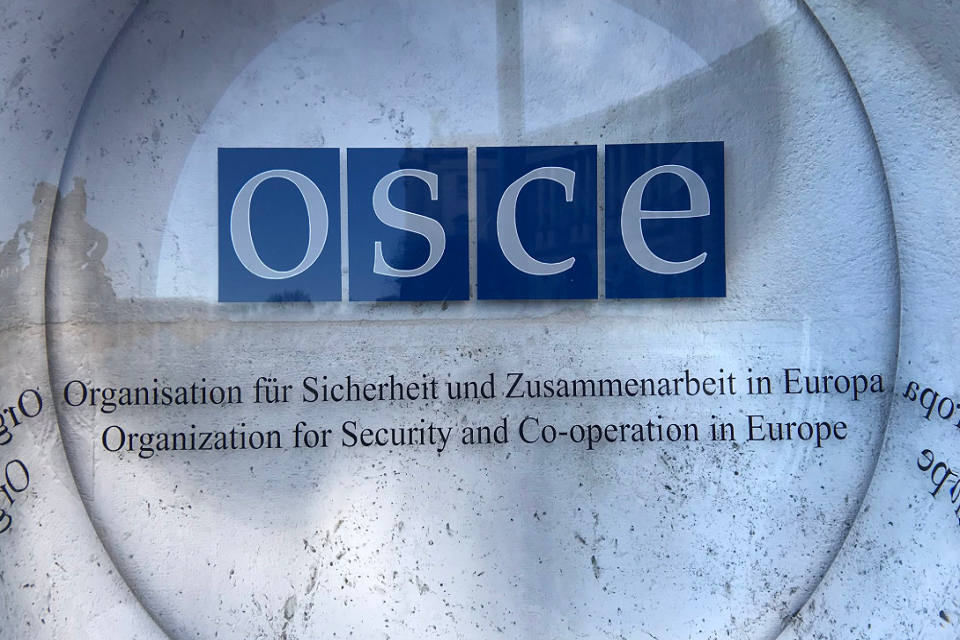Report by OSCE Conflict Prevention Centre: UK response, October 2022
Ambassador Bush thanks Director of OSCE's Conflict Prevention Centre, Ambassador Yrjölä, for CPC's work in the face of Russian aggression in Ukraine and beyond.

Thank you, Chair. Thank you, Ambassador Yrjölä, for your timely report. Russia’s invasion of Ukraine has fundamentally impacted the OSCE and undermined Euro-Atlantic security. Over the last two years, there has also been a reversal of a falling trend in fatalities from armed conflict globally, as highlighted by the UN Secretary General. Against this backdrop, it is more important than ever that the OSCE conflict cycle instruments are robust to deal with contemporary security challenges.
Ambassador, today is an opportunity to reflect and take stock of our work to promote comprehensive security. Prior to its invasion, Russia blocked the mandate renewals of the Border Observer Mission, the Special Monitoring Mission, and the Project Co-ordinator in Ukraine. Russia lied about its unprecedented military buildup on the borders of Ukraine and refused to engage in good faith in the Renewed European Security Dialogue. And since the 24 February, Russia, enabled by Belarus, has brought a new wave of indefensible suffering on the Ukrainian people across land, air, sea, and cyberspace. It has tried to change the status of Ukrainian territory through attempted annexation and sham referenda. And throughout, Russia continues to lie about it, week-in-week-out, right here in this room.
At the same time, Russia continues to undermine Georgia’s sovereignty and violate its territorial integrity by recognising the so-called independence of Georgia’s Abkhazia and South Ossetia regions and its attempted borderisation tactics. In Moldova, Russian forces and munitions remain present without the consent of the Moldovan government. We continue to support efforts to ensure peaceful resolutions to the conflicts in Georgia and Moldova.
The Conflict Prevention Centre (CPC), as the OSCE ‘nerve cell’, plays a vital role in responding to these situations, through its international reporting, early warning, dialogue facilitation, mediation, rehabilitation, and programme management. It continues to strengthen the security of States and wider regions through its support to the field missions, their host countries, and Special Representatives, as well as here in Vienna by providing invaluable support to the FSC.
We remain grateful to the Secretary General for her decisive action in providing early warning to the Permanent Council in February on the situation in Ukraine. Early warning is a vital tool to get right, and as the OSCE-wide Focal Point, we rely on CPC for its analysis in this space.
Thank you to all those involved for the important work in evacuating international mission members from the Special Monitoring Mission to Ukraine (SMM) and supporting the relocation of national mission members to safer locations within the country in February. We call on Russia for the immediate release of our OSCE colleagues currently in detention in Donetsk and Luhansk.
We agree that conventional arms control and confidence building measures remain crucial. The Belarusian authorities’ obfuscation and Russia’s refusal to engage with the two invocations of the Vienna Document Chapter three mechanism was an important early warning signal. We share your concerns about the impact of recent military escalation between Armenia and Azerbaijan, and recognize the quick deployment of a ‘needs assessment’ to establish the facts and gather verified information in the conflict-affected areas.
We welcome the various tools being utilised in response to the crisis in Afghanistan, where OSCE activities can help to address vulnerabilities and support connectivity and development for the region.
We also welcome the role field missions play in facilitating dialogue to address the escalation of tensions in border areas.
In each of these cases, we have been pleased to see an inclusive, holistic and gender-sensitive approach adopted. Inclusivity and the role of women in particular must be mainstreamed into both the informal and formal aspects of peace processes, enabling an environment for women to be able to speak up for their rights, their communities, and their futures.
Ambassador, your report is a helpful reminder that we have a set of tools available to de-escalate and build trust. And while these tools can constantly be strengthened, we must recognise that all the available resources can only be as effective as we – States - allow them to be. We must demonstrate the political will to use OSCE and other resources and to fully implement the principles and commitments that underpin comprehensive security.
I join others in thanking you and your team for your ongoing support to each OSCE State facing a current conflict situation. The coming year will be no less challenging and will require our renewed commitment to conflict-prevention, securing and sustaining peace. Thank you.